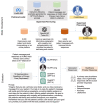Leveraging large language models for generating responses to patient messages-a subjective analysis
- PMID: 38497958
- PMCID: PMC11105129
- DOI: 10.1093/jamia/ocae052
Leveraging large language models for generating responses to patient messages-a subjective analysis
Abstract
Objective: This study aimed to develop and assess the performance of fine-tuned large language models for generating responses to patient messages sent via an electronic health record patient portal.
Materials and methods: Utilizing a dataset of messages and responses extracted from the patient portal at a large academic medical center, we developed a model (CLAIR-Short) based on a pre-trained large language model (LLaMA-65B). In addition, we used the OpenAI API to update physician responses from an open-source dataset into a format with informative paragraphs that offered patient education while emphasizing empathy and professionalism. By combining with this dataset, we further fine-tuned our model (CLAIR-Long). To evaluate fine-tuned models, we used 10 representative patient portal questions in primary care to generate responses. We asked primary care physicians to review generated responses from our models and ChatGPT and rated them for empathy, responsiveness, accuracy, and usefulness.
Results: The dataset consisted of 499 794 pairs of patient messages and corresponding responses from the patient portal, with 5000 patient messages and ChatGPT-updated responses from an online platform. Four primary care physicians participated in the survey. CLAIR-Short exhibited the ability to generate concise responses similar to provider's responses. CLAIR-Long responses provided increased patient educational content compared to CLAIR-Short and were rated similarly to ChatGPT's responses, receiving positive evaluations for responsiveness, empathy, and accuracy, while receiving a neutral rating for usefulness.
Conclusion: This subjective analysis suggests that leveraging large language models to generate responses to patient messages demonstrates significant potential in facilitating communication between patients and healthcare providers.
Keywords: artificial intelligence; clinical decision support; large language model; patient portal; primary care.
© The Author(s) 2024. Published by Oxford University Press on behalf of the American Medical Informatics Association.
Conflict of interest statement
The authors do not have conflicts of interest related to this study.
Figures






Update of
-
Leveraging Large Language Models for Generating Responses to Patient Messages.medRxiv [Preprint]. 2023 Jul 16:2023.07.14.23292669. doi: 10.1101/2023.07.14.23292669. medRxiv. 2023. Update in: J Am Med Inform Assoc. 2024 May 20;31(6):1367-1379. doi: 10.1093/jamia/ocae052. PMID: 37503263 Free PMC article. Updated. Preprint.

